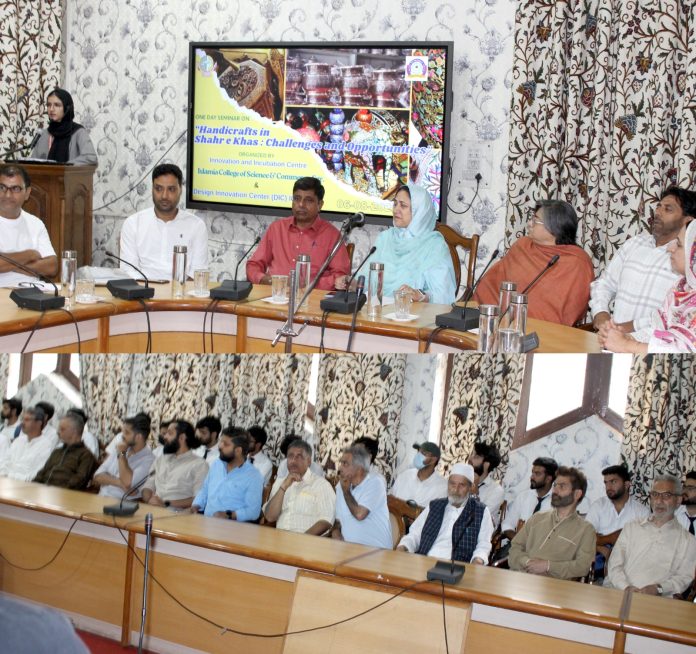SRINAGAR: Islamia College of Science and Commerce, Srinagar organized a daylong seminar on ‘Handicrafts in Shahr-e-Khas: Challenges and Opportunities,’ today.
The event brought together a confluence of renowned artisans, academicians, industrialists, researchers, students, and Government officials, all committed to rejuvenating the traditional handicrafts sector rooted in the historic downtown Srinagar popularly known as Shahr-e-Khas.
The seminar was formally inaugurated by the Principal of the College, Professor (Dr.) Tehmina Yousuf, who in her presidential address, emphasized the critical need to preserve and revitalize Kashmir’s rich artistic legacy. She underscored the importance of bridging the traditional knowledge systems of artisans with modern market mechanisms through academia-industry linkages and innovation.
Prof. Tehmina stated that such platforms are vital in creating sustainable, entrepreneurial, and economically viable ecosystems for the region’s heritage crafts.
Dr. Zahoor Ahmad Jhat, Convenor, Innovation & Incubation Centre elaborated on the College’s vision of fostering innovation and entrepreneurship especially among the youth in the realm of traditional crafts.
The seminar witnessed insightful deliberations by eminent speakers including, Prof. Arshad Suleh, Head, Department of Art, College of Education, who deliberated on the existential challenges threatening this traditional sector such as limited global exposure, dwindling artisan engagement, and market competition from machine-made replicas.
Prof. Fayaz A. Nika, Dean, School of Management Studies, Central University of Kashmir, highlighted the role of higher education institutions and scientific innovation in revitalizing the crafts industry and addressing bottlenecks.
Aamina Asad, Chief Designer, Department of Handicrafts & Handlooms, J&K, and Dr. Yasir A. Mir, Assistant Professor, NIFT Srinagar, contributed with key insights on design innovation, modern branding strategies, and digital outreach.
The seminar featured panel discussions and interactive sessions, enabling students, young researchers, and budding entrepreneurs to explore innovative start-up models and business frameworks centered around traditional crafts.
Participants deliberated on themes such as heritage conservation, design development, export potential, digitization, marketing, and incubation opportunities.
Several artisans from the downtown areas of Srinagar enriched the event with their lived experiences, highlighting on-ground realities and the resilience of the craft sector. The event also attracted research scholars and experts from reputed institutions and central universities.


